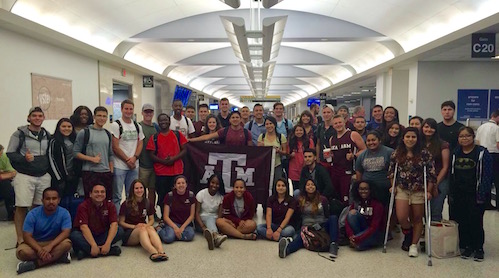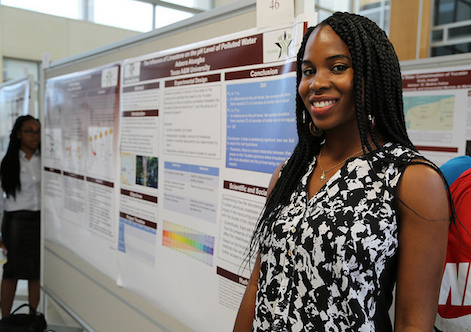Swimming in cenotes, exploring a new culture and learning engineering research practices make for a unique and high impact global experience. This is exactly what students from Engineering Learning Community Introduction to Research (ELCIR) Program experienced over the past two summers in Yucatan, Mexico. The program has shown positive impact on the students’ self confidence, global mindset and retention and will take place during summer 2017 again with the increased capacity for 60 students.
The ELCIR Program, which started in the spring of 2015, was possible thanks to the collaboration and partnership between the Access and Inclusion Program, Dr. Sonia Garcia, senior director, the Halliburton Engineering Global Program, Ms. Maria Alves, director, and by the Yucatan Initiative Project, Dr. Zenon Medina-Cetina, principle investigator and associate professor of civil engineering. The ELCIR Regents program was funded by the TAMUS LSAMP and by the Louis Stokes Alliance for Minority Programs; while all laboratory visits are sponsored by members of the Yucatan Research Consortium participating in the Yucatan Initiative Project, and all cultural activities was sponsored by the Government of Yucatan.

The ELCIR is a program linked to the college’s Engineering Success Program, under the Access and Inclusion program, designed to support economically disadvantaged first generation underrepresented minority students. It has been shown that global experience can greatly enhance a student’s college experience and make them more impactful after graduation; however, the cost of this can hold students back from participation in such experiences. Through the TAMUS LSAMP grant(s), Regents’ Scholars students were able to participate in this high impact global and research experience fully funded.
In 2015 when the ELCIR Program was launched, the objectives of the program were to expose freshman first generation and underrepresented minority engineering students to research by participating in a one-credit research abroad class. This class provided students the opportunity to gain global research knowledge, and cultural experience, while allowing them to engage on research activities with researches from Yucatan. The results of the 2015 program were so positive that for 2016 the program was open to non-regents’ scholars as well, meaning, to any other engineering student who is not participating in the Engineering Success Program. As well, the ELCIR Program is open to students in the TAMU Qatar campus and will have at least 5 students from Qatar participating in 2017. The goal of the ELCIR program is to prepare all students, but particularly, underrepresented minority students who are regents’ scholars, for future international and research opportunities through the College of Engineering.
The 2015 ELCIR Program had the participation of 17 regent scholar students. For the 2016 program, the group grew to 46 students, 28 freshman regents’ scholars and 18 freshman. The 1-credit-course starts with multiple workshops during the spring semester where students learn about Mexico and in particular about the Yucatan Peninsula, the expectation of the program and receive all the travel and security orientations.
The highlight of the course is a two-week trip to Yucatan, Mexico where students take the course ‘Introduction to Research’ taught by faculty members from the Universidad Marista in collaboration with Dr. Medina-Cetina. In addition, students visited a different research institution member of Yucatan Research Consortium (SIIDETEY) every day, where they have ‘hands on’ experiences on research projects of the Yucatan Initiative led by faculty both in Yucatan and Texas A&M.
During their time abroad, students also visit a number of cultural sites and tour the heart of the Mayan civilization in Yucatan. Learning about the intersection of the European and the Mayan cultures, and how they manifest in the region’s own speaking, food and customs, which depart significantly from well-known landscapes and customs of Northern and Central Mexico. Students learn about how proud of the resulting Spanish and Mayan mixture or ‘mestizaje’ defines the Yucatecans of today. And with that start to appreciate the cultural differences and simulates of different people.
For the students to leave a true “intellectual footprint” in Yucatan, a well-balanced schedule is designed and implemented, including course contents and research experiences, but also guided visits to Yucatan’s main Mayan archaeological sites such as Chichen Itza, an archeological and World Heritage Site; the Dzibilchaltun Mayan site; the Ruta Puuc, secondary roads connecting five well-preserved Mayan archaeological sites finishing in Uxmal, the hearth of the Mayan cultural expressions; and Xcaret, a natural sanctuary where the history of Mexico combines with fun traditions and the splendor of the beautiful Yucatan window to the Caribbean.

After returning from Mexico, students become part of an online learning community and continue their research while also developing a research proposal from a topic they identify during the two-week visit to Yucatan. This one-credit graded course under the ELCIR Program is concluded with a poster session in the fall where the students present their research proposal. For the 2016 program the poster session took place in the fall where students presented their research to peer students, faculty members and administrators of the College of Engineering, more than 100 people attended the poster presentation.
“This study abroad had an amazing impact on me,” said Sergio Nevarez, an ELCIR 2016 participant and Regents’ Scholar. “It gave me a broader understanding of real-world applications to concepts learned in class. It also made me realize that I want to make a difference by being an engineer through setting a positive footprint in this world."
Another unique aspect of the program is that during their time in Merida, rather than staying in a hotel, students stay with local families and get integrated in the daily lives of their host Mexican families. One of the Sundays is called “family day” and students spend the Sunday as a typical Mexican family Sunday. The students who participated in the past two programs said the trip was a once in a lifetime experience and a unique opportunity to combine research fundamentals, new cultures and a study abroad in one trip. The experience has inspired some of them to continue exploring new cultures and inspired others to lead by example as an engineer and through research. Many of the ELCIR students are still actively connected with their families private social media networks.
“My first year in the Engineering Learning Community as a Regents' student has proven that I could have a bright future no matter what type of background I have come from, as long as I was willing to accept the help offered to me and to work as hard as possible,” said Brittany Spriggs, an ELCIR participant and Regents’ Scholar.
Application for the 2017 program is currently open on the Halliburton Global Programs website.
“There is not a day that goes by that I do not think of and appreciate the professional, cultural and personal value that the Mexico [research] trip has proven to possess,” said Spriggs.